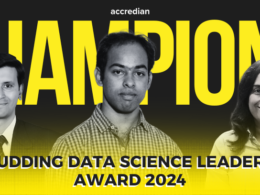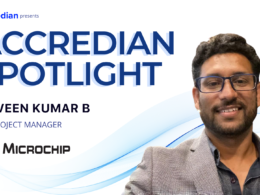Presenting to you the Accredian Spotlight Budding Data Science Leader interview series. This is a series of interviews of budding data science leaders, enrolled with Accredian in different courses. These students coming from diverse backgrounds and even different fields, have rich experience in their own domains.
They have interesting views to share with the world, their experience in the industry, what brought them to the field of data science and many other such interesting aspects. These interviews will enrich the readers about the insights, trends and many other related points.
In a recent conversation, we spoke to Pankaj Mishra who is enrolled in the GCDAI program at Accredian.
Name: Pankaj Mishra
Current Organisation: ETRM Services
Total Experience: 12 years
Batch: Global Certificate in Data Science and Artificial Intelligence (GCDAI) January 2019
Ankita: So, Pankaj could you walk me through your career journey; what has been your education and the professional experience?
Pankaj: I have an experience of 12 years. My main domain is Energy and Finance. The objective of my role is to do risk evaluations and develop business models that involve all the energy products. So, when I say energy products, it includes power, gas modeling, oil modeling, and some of the financial products also. I am specifically working on a tool that is specific for modeling all these financial and energy-related instruments and that involves a lot of risk evaluation also, because it’s a trade capturing system.
By trade capturing system, I mean all the trading happening around the world. They capture it, model it and evaluate their risk numbers and then build their list of the trading. So, the main objective of my role is to build models and do risk evaluation and the latter part involves a lot of data evaluation. This is how I actually got attracted to Data Science.
About my educational background- I have a Master’s in Computer Application. After this, I got a job in a consulting firm called Sapient. Thereafter, I moved on to another consulting firm, called ETRM Services, where I am now working as a Practice Lead.
Ankita: What got you interested in Data Science and Machine Learning space?
Pankaj: My primary role is to do risk evaluation. In this process, a lot of data manipulation, data evaluation and data modeling is required. This is done by a tool but that is a black box to us, meaning we just put some numbers and get the results.
We then use these numbers for the rest of the processing. But how that data is getting evolved, is something which is very specific to Data Science and Machine Learning because it collects a lot of data, evaluates those data and based on that data, predicts the next set of outputs, which we use it for risk evaluation.
This was kind of the same objective, which attracted me towards Data Science. I wanted to go in a direction where I can utilize my domain skills into diving deep to get detailed information out of Data Science and Machine Learning algorithms.
Currently, I’m leading a practice in my company and that involves explaining to others what we do. In explaining something to others, there are lots of questions asked and I should be clear about these, before I explain it to others.
This is one point where I know Data Science will help me in evaluating those numbers and getting the results out of it.
Ankita: My next question to you would be- which is your favorite Machine Learning algorithm and why?
Pankaj: Random Tree and Decision Forest is my choice because this relates to my daily working.
Ankita: How do you think has Data Science evolved over the last few years? Are there any current trends in this field that you are most excited about?
Pankaj: Okay, so let me take one of the classic examples- the recommendation system; its effect we can see on almost all the sites.
I mean, it’s not just Netflix, where we watch all the movies but every other website. Talking about me, I like to watch all the war movies and when I started looking at all the war movies, there was always something showing up due to the recommendation system.
This is the evolution happening now. Earlier, we used to search all the things; now, it is available, on its own.
If I’m doing any purchases on Amazon or Flipkart, I’m getting all the recommendations related to what I’m buying on a day-to-day basis. So, this is an evolution, in terms of that people are more active on the internet, are sharing their knowledge, sharing their data outside the workplace.
It is much easier to find a change and is easy to evaluate the data that we are getting from different sources. The source of this data could be human behavior or the various activities that we actually do. Gathering all this data and evaluating it to put into the prediction engine or recommendation system for its effective working, will be much easier now.
Ankita: So, my next question to you is based on the changes you talked about right now, which are visible after all these years. Talking about the future, what current trends in Data Science and AI, do you see becoming very big in the future?
Pankaj: Artificial intelligence will grow like anything in the coming future. Like I said, trends are changing; it’s open-source most of the time; people can take the input and contribute back to the system.
I’ll take one example here, with reference to AI, something I read about in a newspaper article. This was about the parking system. One of the main pain points of any public place is getting the proper parking place and knowing which parking street is the correct one, can be identified. With AI-powered systems, you can find the correct parking place in that particular building or at a nearby place.
We have facial recognition and that’s another trend, which can change the world because it can reduce crime. It will be much easier to identify the intruder based on the data provided.
There are many such applications in other sectors, such as health that can have a positive impact on the world. It is not only about identification or getting some application run but is more concerned about how you can make life easier and more futuristic, from the very beginning.
Ankita: At Accredian, students are encouraged to maintain high-quality GitHub profiles. Have you also built a GitHub profile? How do you think this will help you?
Pankaj: As of now, I am working on my GitHub portfolio. I was aware of GitHub but never created my own, earlier. But thanks to the Accredian sessions, I came to know how useful can be a GitHub portfolio to showcase your work. I am working on all modules, papers, and practical work, etc. to include in my portfolio.
Ankita: Given that you are a working professional and are also pursuing a course at Accredian, how are you able to maintain a balance between studies and work?
Pankaj: My professional role calls for a lot of admin work and I am heading India practice. So, it is usually an hour or two at night that I spend for my Accredian studies. The classroom documents provided to us are also very useful in picking up pace in the studies.
Ankita: What will be your advice to anyone who wants to start a career in Data Science and who is actually a fresher in this field?
Pankaj: Don’t get overwhelmed by the lots of data that is available. You have to start from the start. I remember, Dr. Kirk Borne said, “Start small, think big.” Even I am following it.
I know there are a lot of things to do but I’m thinking big in my own domain, how can I make a difference? And, I’m starting small. So, in a one by one step, at least start gaining knowledge every day, every week, every month and start adding to your profile.
This will definitely add up to your knowledge and make you rich in experience in Data Science, Machine Learning and AI.
Ankita: That was my last question and brings us to the end of the interview. One last thing, if you wish to share anything about your journey with Accredian so far; any feedback, anything that you would like to talk about.
Pankaj: Everything is good. I really liked this interview because it has given me the confidence to speak about the things I know and share my views. Like I said, I am starting small but I know it is in the right direction with Accredian.
I really appreciate all the hard work that the trainers put in on a day to day basis, especially their patience in terms of connecting with so many students who might not have done programming ever. I recommend Accredian to many people.
Ankita: Thanks a lot! It was nice talking to you. Have a nice day.
Pankaj: Same here. Nice talking to you. Thank you!





